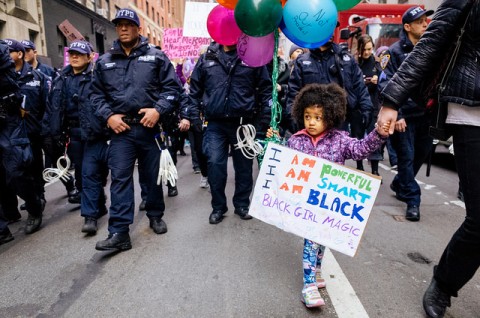Marching and loving
As I marched alongside sisters, mothers, and daughters, I remembered how my religious upbringing robbed me of my ability to love.

I joined my diverse sisters and brothers in Chattanooga, Tennessee on Saturday for our local Women’s March. I recognized so many familiar faces, people I knew well because we have been protesting for health care expansion, religious freedom, and Black Lives Matter for years. We have held signs, chanted slogans, and sung endless choruses of “We Shall Overcome.” As I looked around, I smiled as the protest grew beyond our usual vigil attendees. Thousands poured onto the park, with signs opposing white supremacy, sexual assault, and income inequality.
We began to march, and our numbers kept swelling, as people joined us from neighboring apartment buildings. The organizers had hoped for five hundred—they could have never predicted the thousands who joined. We could no longer fit on the sidewalk, so we moved to the streets and onto the bridge where cars normally travelled. As our voices soared, we sang for our mothers, our sisters, and our daughters. My heart swelled with love for my neighbors, and I longed to keep this lens that the march had lent to me. The tint and hue of the view was so much different from the one with which I had been raised.
As a white conservative Christian, growing up in the religious right and prosperity gospel movements, I had been taught that no one was good unless they went to the same sort of church, adhered to the same doctrines, held the same political convictions, and read the Bible the same way that I did. If they did not, I could not love them. To love them would mean that I could be seduced by their thought, and that they would surely lure me into corruption.
If I had any interaction, it would be to cajole and convert them. Since I was never very good at changing people, I tried to keep to my own kind. I would look for signs that people were like me—a Jesus fish or a Bible camp t-shirt. I tried to see if they listened to contemporary Christian music or read C.S. Lewis. Because art and artists were also not good, unless they believed as I did.
I’m sad for that girl, as I look back on her. I’ve been writing about my journey, my young self, so eager to be good, that she was trapped in an unending cycle of trying to control everyone around her until they reflected her. In my mind, I try to embrace her, because I know it was lonely living that way, and if there is anything that I’ve learned in my middle age, it is that I need friendship like other people need air.
I am reminded of the Queen of Hearts in Alice’s Adventures in Wonderland, who could not appreciate the white roses that surrounded her, unless they were red. Her minions scurried around, painting the flowers until they matched her, until they became a reflection of her own self.
It was the same way with me. I could not appreciate the diverse beauty of those around me, unless they reflected my own thoughts and beliefs. I didn’t do it because I was malicious. Instead, it was out of a deep unease and mistrust that had been engrained in me.
I want to embrace my younger self, because I didn’t know how to love. It was cruel to take love away from someone so young. I had never been taught to love someone on their own terms. I could not appreciate their own delicate color, until it matched mine. Even at such a young age, my love was all wrapped up in controlling other people’s thoughts, actions, and even emotions.
Marching alongside sisters, mothers, and daughters, I remembered how my religious upbringing robbed my ability to love. I knew that the inability to see the good in other people affected my politics. If justice is what love looks like in public, I had failed to love. I didn’t care about people who were hungry or homeless, unless they passed some theological litmus test. I had a justification for this, telling myself that it was more important to feed the soul than it was to feed the body. But really, it was just my way of letting conditional love keep me from following Jesus.
The good news is that it’s not too late to learn to love—to appreciate the crooked smile, the anxious voice, and the infinite beauty of my neighbor. It is not too late to become enraptured with someone, not because they reflect who I am and what believe, but because their thoughts are so deeply their own. It is not too late to call out for justice and to love in public. It is not too late for us to do the things that Jesus taught us.






